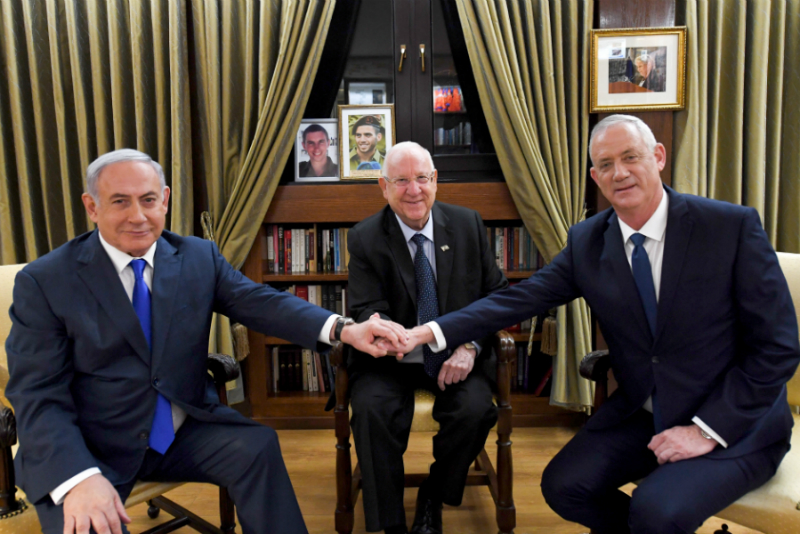Benny Gantz, recently tasked with forming a governing coalition for Israel after Benjamin Netanyahu failed to do so, has until mid-November to fulfil his mandate. All signs indicate it will be a tough assignment for the Blue and White leader, given that Israel’s right-wing bloc, 55 members of Knesset strong, appears united. Meanwhile, negotiations continue – slowly, warily – toward the scenario posed by Israeli President Reuven Rivlin: a unity government with Netanyahu and Gantz – in that order – at the helm for two years at a time.
It’s a risky proposition for Gantz, not least because he is on record proclaiming he would never partner in government with Bibi (Likud yes, just not its leader). His supporters might forgive a change of heart, though, especially with the impending next steps in Netanyahu’s corruption indictments. Under Rivlin’s plan, Netanyahu would resign the premiership if he is indicted, and Gantz would immediately assume authority.
For Gantz, Blue and White and just about anyone who wants to see Netanyahu out of power as soon as humanly possible, that is an enticing prospect. It conveniently removes all agency, however, from Netanyahu and assumes the indictments are a fait accompli. Even if the corruption investigation seems likely to move forward, there’s no guarantee it will end badly for Bibi – if the charges appear minor, he and his supporters will use it as vindication for the next election cycle.
Speaking of which: perhaps the only thing unifying the Israeli electorate these days is that no one wants to have another election, what would be the third in less than a year. Gantz and Netanyahu are both wary of this – neither wants to be seen as the sole roadblock to avoiding more voting (though a recent poll suggests Israelis would be more likely to blame Netanyahu for a hypothetical third campaign). The question remains who will blink first.
Here in Canada, the situation, after the Oct. 21 federal election, is similar and dissimilar. The incoming Liberal government, diminished from majority to minority, will be forced to partner with its previously stated foes. Alliances on the left appear the most likely, but there is also the interesting possibility of a Liberal-Conservative collaboration on the issue of pipelines. Hopefully there is room for an even broader consortium against Quebec’s secularism law. (Back in Israel, by contrast, the prospect of a minority government seems implausible.)
Most Canadians would probably tell you they don’t have an appetite for another election in the near future, but reality could send them back to the polls. Minority governments don’t have a long shelf life. The Liberals are surely already trying to figure how to return to a majority position, while the Conservatives, spurred by their win in the popular vote, aim to translate that into more seats in the House of Commons. Like it or not, another election is coming sooner rather than later.
Canada’s minority and Israel’s proposed unity governments wouldn’t function the same way, but in some respects they are not all that different. Both ultimately force political rivals – people who say downright nasty things about one another – to work together. They are obliged to find points of agreement while acknowledging their differences. Otherwise, things quickly fall apart.
We’re about to get a first-hand perspective in Canada on the imperfect, but potentially creative possibilities of political co-operation. It may be a bumpy ride, but Canadians might at least expect that the more sensible among the political class will give it a sincere shot. In Israel, the electorate still waits to see whether its leaders can find a way to do the same.
